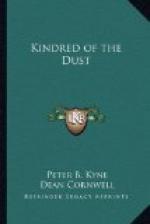“If you could procure work—some profession to keep your mind off your troubles—I have some property in Tacoma—suburban lots with cottages on them.” The Laird grew confused and embarrassed because of the thought that was in the back of his mind, and was expressing himself jerkily and in disconnected sentences. “I do not mean—I do not offer charity, for I take it you have had enough insults—well, you and your father could occupy one of those cottages at whatever you think you could afford to pay, and I would be happy to advance you any funds you might need until you—could—that is, of course, you must get on your feet again, and you must have help—” He waved his hand. “All this oppresses me.”
The remembrance of Mrs. Daney’s interview with her prompted the girl to flash back at him.
“‘Oppresses,’ Mr. McKaye? Since when?”
He gazed upon her in frank admiration for her audacity and perspicacity.
“Yes,” he admitted slowly; “I dare say I deserve that. Yet, mingled with that ulterior motive you have so unerringly discerned, there is a genuine, if belated, desire to be decently human. I think you realize that also.”
“I should be stupid and ungrateful did I not, Mr. McKaye. I am sorry I spoke just now as I did, but I could not bear—”
“To permit me to lay the flattering unction to my soul that I had gotten away with something, eh?” he laughed, much more at his ease, now that he realized how frank and yet how tactful she could be.
“It wasn’t quite worthy of you—not because I might resent it, for I am nobody, but because you should have more faith in yourself and be above the possibility of disturbance at the hands—or rather, the tongues—of people who speak in whispers.” She came close to him suddenly and laid her hand lightly on his forearm, for she was speaking with profound earnestness. “I am your debtor, Mr. McKaye, for that speech you found it so hard to make just now, and for past kindnesses from you and your son. I cannot accept your offer. I would like to, did my pride permit, and were it not for the fact that such happiness as is left to my father can only be found by the Bight of Tyee. So, while he lives I shall not desert him. As for your apprehensions”—she smiled tolerantly and whimsically—“though flattering to me, they are quite unnecessary, and I beg you rid your mind of them. I am—that which I am; yet I am more than I appear to be to some and I shall not wantonly or wilfully hurt you—or yours.”
The Laird of Tyee took in both of his the slim hand that rested so lightly on his sleeve—that dainty left hand with the long, delicate fingers and no wedding ring.
“My dear child,” he murmured, “I feel more than I dare express. Good-by and may God bless you and be good to you, for I fear the world will not.” He bowed with old-fashioned courtesy over her hand and departed; yet such was his knowledge of life that now his soul was more deeply troubled than it had been since his unintentional eavesdropping on his manager’s garrulous wife.




